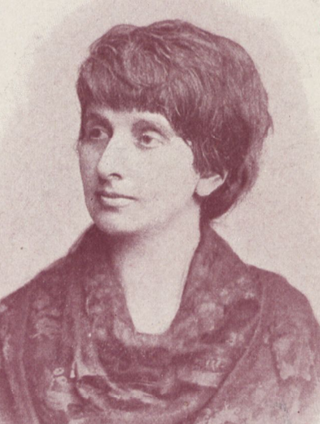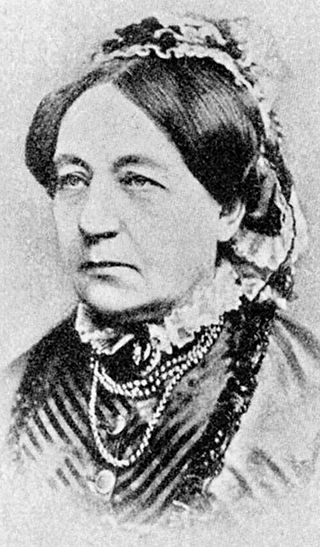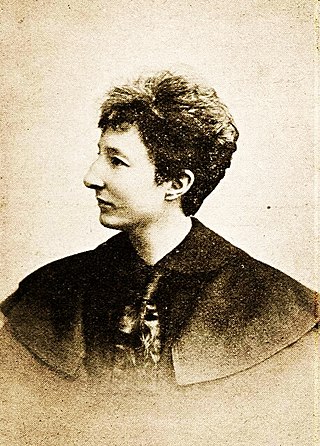Related Research Articles

Lily Braun, born Amalie von Kretschmann, was a German feminist writer and politician of the Social Democratic Party (SPD).
Heymann is a German surname. Notable people with the surname include:

Helke Sander is a German feminist film director, author, actress, activist, and educator. She is known primarily for her documentary work and contributions to the women's movement in the seventies and eighties.

Marianne Adelaide Hedwig Dohm was a German feminist and author.

Louise Otto-Peters was a German suffragist and women's rights movement activist who wrote novels, poetry, essays, and libretti. She wrote for Der Wandelstern [The Wandering Star] and Sächsische Vaterlandsblätter [Saxon Fatherland Pages], and founded Frauen-Zeitung and Neue Bahnen specifically for women. She is best known as the founder in 1865 of the General German Women's Association.
The German League for Human Rights was founded on 16 November 1914 as the pacifist group Bund Neues Vaterland by pacifist activist Lilli Jannasch and others. Among its members: Albert Einstein, Friedrich Simon Archenhold, Walther Borgius, Elsbeth Bruck, Minna Cauer, Hans Delbrück, Kurt Eisner, Friedrich Wilhelm Foerster, Alfred Hermann Fried, Alexander Futran, Hellmut von Gerlach, Rudolf Goldscheid, Emil J. Gumbel, Paul Guttfeld, Arthur Holitscher, Harry Graf Kessler, Gustav Landauer, Otto Lehmann-Rußbüldt, Ernst Meyer, Georg Friedrich Nicolai, Paul Oestreich, Hans Paasche, Ludwig Quidde, Heinrich Rausch von Traubenberg, Ernst Reuter, Helene Stöcker, Leopold von Wiese, Clara Zetkin, and Stefan Zweig. Based in Germany is also the 'International League for Human Rights' or Internationale Liga für Menschenrechte (ILMR), associated with the European League for Human Rights AEDH and the FIDH.

Helene Lange was a pedagogue and feminist. She is a symbolic figure of the international and German civil rights feminist movement. In the years from 1919 to 1921 she was a member of the Hamburg Parliament. In 1928 she was honoured with the Grand Prussian State Medal "For Services to the State".

Margarethe Lenore Selenka was a German zoologist, anthropologist, feminist and pacifist. She researched apes and led scientific expeditions to the Dutch East Indies.

The Open Christmas Letter was a public message for peace addressed "To the Women of Germany and Austria", signed by a group of 101 British suffragists at the end of 1914 as the first Christmas of the First World War approached. The Open Christmas Letter was written in acknowledgment of the mounting horror of modern war and as a direct response to letters written to American feminist Carrie Chapman Catt, the president of the International Woman Suffrage Alliance (IWSA), by a small group of German women's rights activists. Published in January 1915 in Jus Suffragii, the journal of the IWSA, the Open Christmas Letter was answered two months later by a group of 155 prominent German and Austrian women who were pacifists. The exchange of letters between women of nations at war helped promote the aims of peace, and helped prevent the fracturing of the unity which lay in the common goal they shared, suffrage for women.

Lida Gustava Heymann was a German feminist, pacifist and women's rights activist.

Anita Theodora Johanna Sophie Augspurg was a German jurist, actress, writer, activist of the radical feminist movement and a pacifist.

Wilhelmine Theodore Marie Cauer, née Schelle, usually known as Minna Cauer was a German pedagogue, activist in the so-called "radical" wing of the German bourgeois feminist movement, pacifist and journalist. Alongside Anita Augspurg, Cauer was the most prominent figure in the radical feminist movement. In the 1890s she was the undisputed representative and had a special talent for winning over new and younger women to the feminist movement.
Feminism in Germany as a modern movement began during the Wilhelmine period (1888–1918) with individual women and women's rights groups pressuring a range of traditional institutions, from universities to government, to open their doors to women. This movement culminated in women's suffrage in 1919. Later waves of feminist activists pushed to expand women's rights.

Katharina Scheven was a German feminist who was a leader of the campaign against state-regulated prostitution.

Gertrud Baer (1890–1981) was a German Jewish women's rights and peace activist. One of the founding members of the Women's International League for Peace and Freedom, she served as the executive secretary of the German branch of WILPF beginning in 1921 and co-chair of the international organization from 1929 to 1947. Throughout World War II, though leadership was shared, Baer was the primary leader of the organization. At the end of the war, she became the first WILPF consultant to the United Nations and held that post until 1972.

Jeanette Schwerin was a German women's rights activist and a social work pioneer.
Frida Perlen was a German Women's Rights campaigner, journalist and anti-war activist. During the first part of the twentieth century she fought for gender equality in respect of civil rights. After the First World War she was a co-founder of the "Internationale Frauenliga für Frieden und Freiheit" (IFFF), which became the German section of the Women's International League for Peace and Freedom (WILPF).
References
- 1 2 Burbank, Emily M. (November 1895). "WOMAN'S COUNCIL TABLE. SOMER GERMAN WOMEN LEADERS". The Chautauquan. M. Bailey. 22 (2): 207. Retrieved 28 November 2022.
- ↑ Twellmann, 1992, p. 101
- ↑ Twellmann, 1992, pp. 68, 101
- ↑ Heckner-Hagen, Ursula (1983). The Struggles and Accomplishments of Women White Collar Workers in Imperial Germany, 1889-1914: Der Verband Für Weibliche Angestellte. University of California, Davis. p. 39. Retrieved 28 November 2022.
- ↑ Heymann in Twellmann, 1992, p. 69
- ↑ Twellmann, 1992, pp. 69, 101
